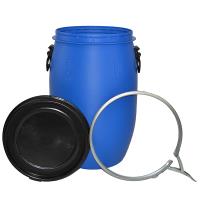 Add My Company
Add My Company
Sign In

An intermediate bulk container (IBC) is a fantastic way to store industrial-size quantities of liquids and semi-liquids in a safe and secure way.
IBCs are lightweight plastic containers, often fitted out with a steel cage for support and protection. They are durable, robust, hardwearing and reusable. But before investing in a set of IBCs to fulfil your storage and transport needs, you might be wondering how heavy an empty intermediate bulk container is.
After all, it’s important for both practical and health and safety purposes to know how an empty IBC can be handled and where you are able to store them when they aren’t in use. In this article, we take a quick look at the weight of an IBC.
HOW MUCH DOES AN EMPTY IBC WEIGH?
A standard intermediate bulk container is made from HDPE (high-density polyethylene), a type of plastic. The plastic is encased in a steel cage, and there will be added nozzles or caps depending on the design of the IBC.
IBCs can be produced in a number of different capacities, with the most common size being 1,000 litres. A standard 1,000-litre IBC complete with a nozzle and steel cage weighs in at around 65 kilos when empty.
This weight goes up if you have more attachments, such as an IBC cover or extra nozzles for filling or emptying, but it never varies too much. When a 1,000-litre IBC is full of liquid, it weighs at least 1,065 kilos, if at capacity.
CAN YOU STACK EMPTY IBCS?
IBCs are designed to be stacked one on top of the other. This allows you to make the most of your storage space and to keep your IBCs organised and easy to access if you have multiple containers.
For industrial needs, this is perfect. IBCs can be stacked in a warehouse or in trucks for transport. The steel cage allows the IBC to be better stacked, and also protects the plastic material from damage in the event of a fall or collision while being moved.
At 65 kilos when empty, an IBC can’t be lifted by hand however. It’s just too heavy, and warehouses workers should never be expected to lift more than 20 kilos unaided. IBCs are designed to be stacked using a forklift or other heavy machinery, with the steel cage aiding in this procedure.
IBCs that are full can also be safely stacked, as long they are contained within the protective steel cage. Again, a forklift is the only way to do this safely.
Before stacking an IBC that contains liquid, you need to ensure that you’ve carried out a full health and safety check of the area where you’re storing the containers. Don’t stack next to flammable or dangerous materials and, if stacking for transport, make sure you have emergency procedures in place.
Importantly, you should also check that all stacked IBCs are securely closed. This could mean checking the bung or making sure that nozzles are securely fastened. For transport, IBC covers add an extra level of security and safety.
HOW LONG DO IBCS LAST?
One of the reasons why IBCs are so popular in an industrial capacity is because they are so hardwearing. With a secure frame and correct stacking procedures, IBCs can last a long time. An IBC should last for decades, although it needs to be checked and certified every five years for health and safety.
To improve the lifespan of an IBC and prevent cross contamination, it should be thoroughly cleaned and disinfected after each use. Especially if you are changing the liquids being stored inside it. If you plan to store foodstuff or drinking water, you shouldn’t reuse an IBC for chemical purposes. Stick to the food and drink for health and safety!
At the end of their lifespan, a quality IBC can be recycled and repurposed for other means, either industrial or personal.
CONTACT ITP PACKAGING FOR ALL YOUR INTERMEDIATE BULK CONTAINER NEEDS
At ITP Packaging, we stock a wide range of containers guaranteed to meet industrial storage needs. We stock the classic 1,000-litre intermediate bulk container complete with steel cage and a wide range of attachments and covers.
Our team are on hand to help with your industrial packaging needs and to answer any further questions you might have about IBCs. Contact ITP Packaging today to find out more.
For more information on How heavy is an empty intermediate bulk container? talk to ITP Packaging Ltd
Enquire Now
List your company on FindTheNeedle.

